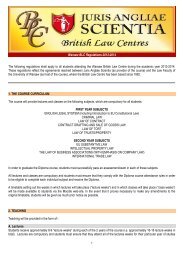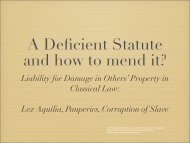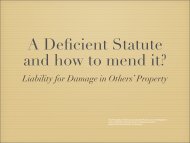Presentation
Presentation
Presentation
Create successful ePaper yourself
Turn your PDF publications into a flip-book with our unique Google optimized e-Paper software.
6 With regard to a eunuch in particular it has been inquired whether he<br />
would seem to have been sold contrary to the aediles' edict, if the purchaser<br />
did not know that he was a eunuch. 7 They say that Labeo ruled that he<br />
could be returned as diseased; 8 and that Labeo also wrote that if sows were<br />
sterile and had been sold, action could be brought on the basis of the edict<br />
of the aediles. 9 But in the case of a barren woman, if the barrenness were<br />
congenital they say that Trebatius gave a ruling opposed to that of Labeo. 10<br />
For while Labeo thought that she could be returned as unsound, they quote<br />
Trebatius as declaring that no action could be taken on the basis of the edict,<br />
if the woman had been born barren. But if her health had failed, and in<br />
consequence such a defect had resulted that she could not conceive, in that<br />
case she appeared to be unsound and there was ground for returning her. 11<br />
With regard to a short-sighted person too, one whom we call in Latin<br />
luscitiosus, there is disagreement; for some maintain that such a person<br />
should be returned in all cases, while others on the contrary hold that he can<br />
be returned only if that defect was the result of disease. 12 Servius indeed<br />
ruled that one who lacked a tooth could be returned, but Labeo said that<br />
such a defect was not sufficient ground for a return: "For," says he, "many<br />
men lack some one tooth, and most of them are no more diseased on that<br />
account, and it would be altogether absurd to say that men are not born<br />
sound, because infants come into the world unprovided with teeth."














